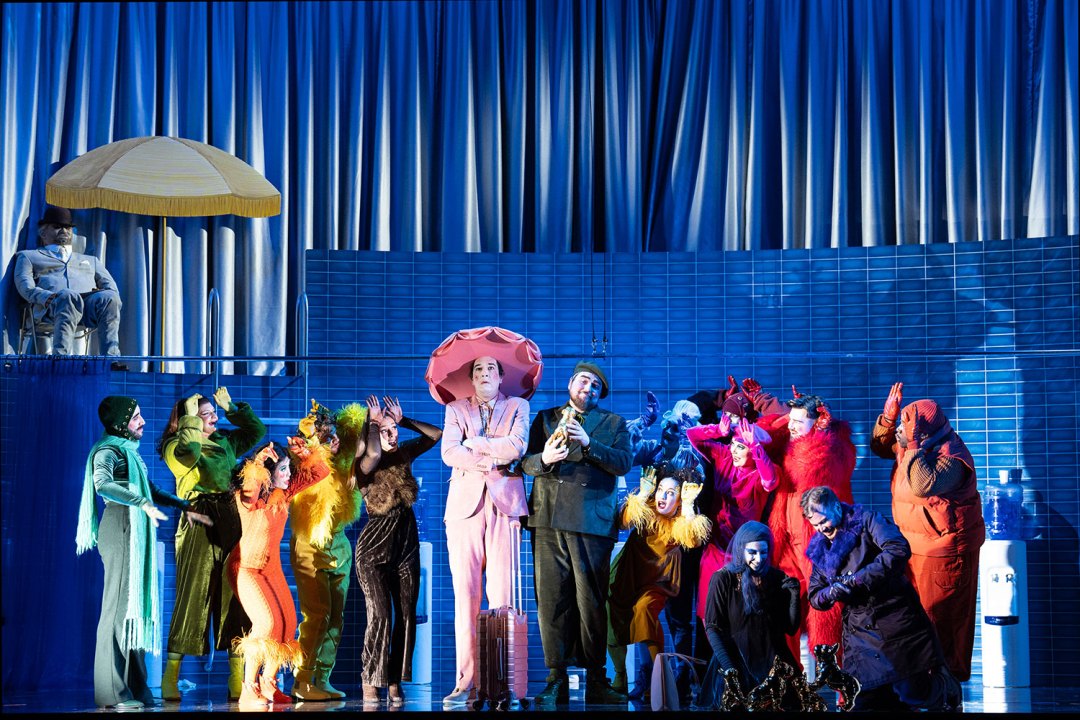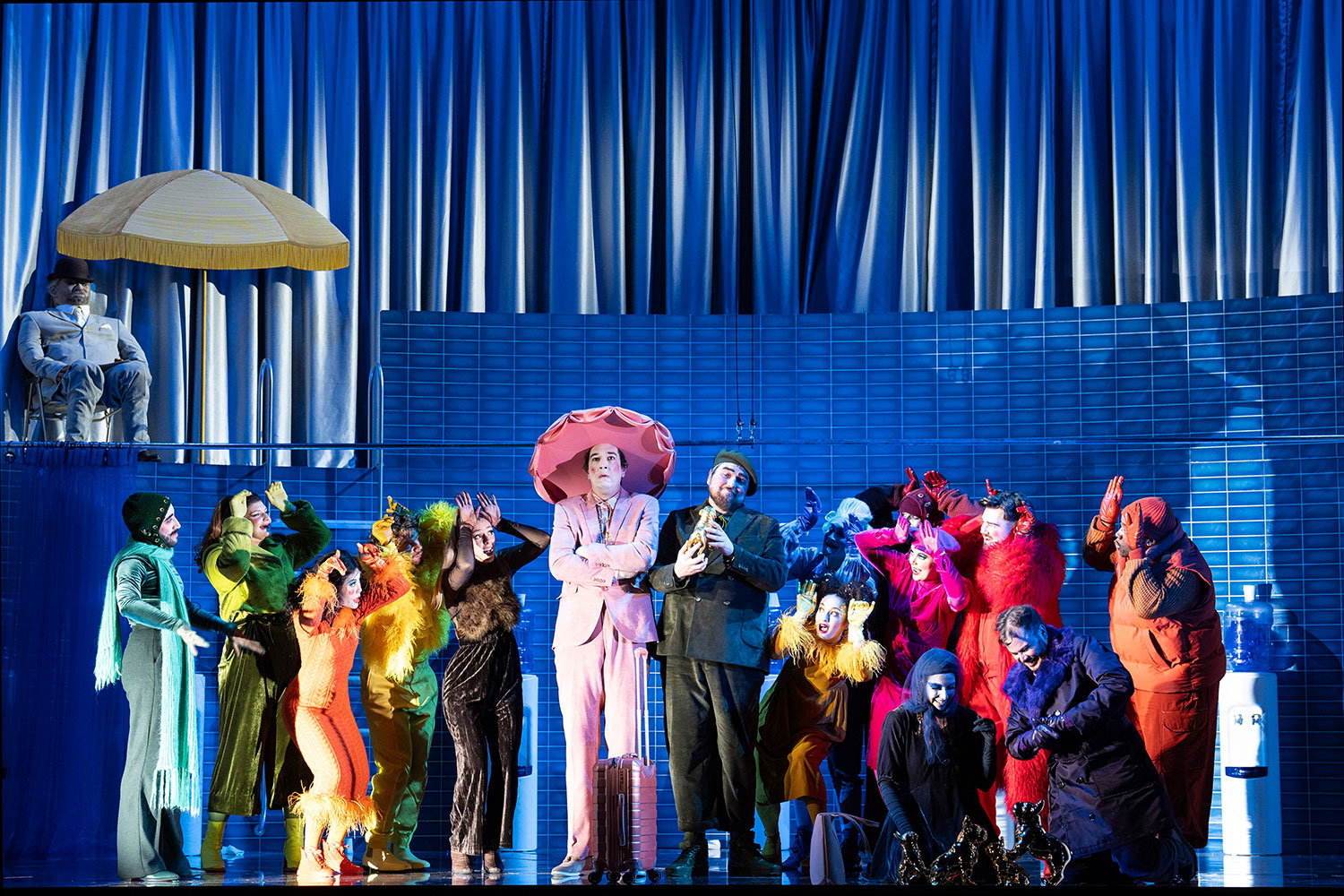In 1937, John Barbirolli took six pieces by Henry Purcell and arranged them for an orchestra of strings, horns and woodwinds. Nothing unusual about that: arranging baroque music for modern symphony orchestras was what famous conductors used to do. Beecham and Hamilton Harty re-upholstered Handel. Mahler did something similar with Bach, then directed the result from a grand piano, and wouldn’t you give anything to have heard him? All good clean fun in those innocent days before the advent of historically informed performance.
‘Can you tell me what was happening?’ asked a woman on the way out
It’s unusual to hear these things revived now, and curiouser still when the person doing the reviving is Thomas Adès, currently artist in residence with the Hallé. But here he was, sweeping into Barbirolli’s steroid-pumped Purcell with a 50-piece string section and encouraging the four horns to knock it for six. There wasn’t an inch of flab, either: 21st-century string players know how to vary their vibrato, and the sheer heft and muscularity felt transgressive enough. A solo cor anglais phrased Dido’s Lament with smokey sadness, and that lush body of strings responded as if it was Tchaikovsky. Purcell, eh? Who would have thought the old man to have had so much blood in him?
Adès never conducts anything he doesn’t choose, and if his aim was to flatter his Mancunian hosts with a quick rummage through the Hallé’s archive, there were surely any number of less mischievous options. You shouldn’t necessarily take Adès as a bellwether of general taste, but those who remember when he was routinely described as the next Britten might be pleasantly surprised with the way that, in his middle years, he seems to be bedding in as the new Walton. The Ischia-period Walton, that is: the lover of warmth and abundance, sufficiently comfortable in his own skin not to care what other people think.
So Adès went for Elgar (Sospiri – five minutes of concentrated sorrow as tearstained as anything in Mahler), a world première by Oliver Leith (Cartoon Sun – a study in maxi-minimalist dynamic contrasts for a huge, bell-decked orchestra) and his own Tevot, which seems to have grown grander and more extravagant since its première in 2007. It surged forward like a man-o’-war under full sail; guns run out, musicians practically spilling off the platform and the percussionists rushing to their stations as if they were about to repel boarders. Best of all, if you suspect that Sir Michael Tippett’s entire generation got him disastrously wrong and that we’re only now moving into his longed-for Age of Aquarius, was a performance of Tippett’s Triple Concerto: a work so utterly unconcerned with concert hall economics that this was its first UK performance since 2012. There it sprawled, a huge
exotic blossom at the centre of the programme, breathing its perfume over the music that surrounded it and drawing great sprays of tingling colour from Adès and the orchestra.
That’s not nothing. Just 13 years before Adès’s birth, a BBC orchestra broke down live on air while attempting to play a Tippett symphony. The Hallé gave us glistening precision, and no praise is high enough for the three soloists – Anthony Marwood (violin), Lawrence Power (viola) and Paul Watkins (cello), who sang together gorgeously, making light of their blindingly difficult individual parts. The Tippett revival is one of the great good news stories (god knows we need them) of British music in the past decade. His opera New Year has just been recorded in Glasgow, but shrewd critics will be keeping their powder dry for the Birmingham Opera Company’s full production – the first in 33 years – in July.
I’ve been trying to think of something to say about the English Touring Opera’s production of Puccini’s Manon Lescaut that wouldn’t be unfair to the orchestra and conductor (Gerry Cornelius), who played with energy and warmth, and the cast, who wore the vilest costumes imaginable. They all deserved better than Jude Christian’s production. Jenny Stafford, as Manon, sang tirelessly and expressively in a blue pudding-bowl wig, and Gareth Dafydd Morris, as Des Grieux, was every bit the heart-throb tenor. He was also the only major character who dressed or acted as if he were a believable human being.
It all plays out in a curtained dream-space delineated by office watercoolers and kitschy gold sculptures of French bulldogs. At one point a doppelgänger of Manon appears at a lectern with an overhead projector, and with a new English libretto by Christian (the original writers don’t even get a name check) that delivers such zingers as ‘possibility has driven us to madness’, there’s a definite air of the sociology seminar about it. Manon delivers an angry deconstruction of patriarchal narratives around female agency while dying of thirst. Meanwhile Puccini powers on regardless, like the misogynist swine he is. ‘Can you tell me what was happening?’ asked the woman behind me, on the way out.








Comments